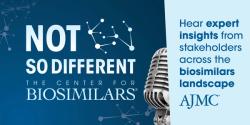© 2026 MJH Life Sciences™ and The Center for Biosimilars - Biosimilars, Health Economics & Insights. All rights reserved.
Gary Lyman, MD, MPH: Biosimilar Epoetin Alfa in Cancer Care
Gary Lyman, MD, MPH, of the Fred Hutchinson Cancer Research Center and Seattle Cancer Care Alliance, discusses the role of the first FDA-approved biosimilar epoetin alfa in cancer care.
Transcript
So the first biosimilar, in fact the only biosimilar in the United States, was approved nearly 2 years ago* and it was based, as I indicated, largely on the preclinical work and pharmacokinetic, pharmacodynamic data and healthy volunteers.
They did run 2 large phase 3 trials, but in patients with chronic kidney disease, not in cancer patients. So in actual fact, the only data on cancer patients with the epoetin alfa biosimilar is observational, not randomized controlled trial data.
Now, it turns out that there is this drug is also available in Europe, known as epoetin zeta. It's essentially the same molecule that’s been approved in Europe. There, they have done large phase 3 trials in patients with cancer showing noninferiority to the originator epoetin alfa. No safety concerns, no immunogenicity concerns.
So the FDA was willing to accept the data from the same drug in Europe plus demonstration of safety and efficacy in advanced kidney failure patients in the United States and say “this should work the same for supporting patients with chemotherapy-induced anemia.”
That indication is not nearly as frequent as it used to be. A lot of concern was raised a few years ago, so the use of these agents as opposed to transfusions has fallen off in the United States, but nonetheless, to have competitive biosimilar versions to lower the prices of these drugs hopefully will work to the advantage of of patients in the overall healthcare system.
*Retacrit was approved by the FDA in May 2018.



